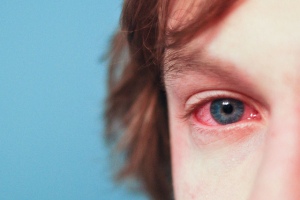What Causes Eye Allergies?
There are several triggers that can result in an allergic reaction affecting the eyes. These most often include outdoor allergens such as pollens from grass, trees, and weeds. Depending on the area of the US that you live in, different allergens present during different times of the year. There are also indoor allergens that can cause redness, itching and watering of the eyes. These include such things as pet dander (usually from cats), dust mites, and mold. Several other irritants can cause symptoms of eye allergies such as cigarette smoke and perfume.Like all other types of allergies, eye allergies start when your immune system identifies an otherwise harmless substance as an allergen. When this occurs, your immune system will overreact to the allergen and cause cells within the tissue of the eye to release chemicals such as histamine, which results in your eyes itching, watering, and becoming red and swollen.

Tips For Preventing Eye Allergies
Try to identify substances that cause your eyes to itch and avoid known allergens as much as possible.- If you find yourself being allergic to outdoor allergens, reduce your time spent outdoors when pollen counts are the highest (typically mid-morning and early evening). Also, when you are outside, be sure to wear your sunglasses. This will act as a barrier for the allergens to reach the surface of your eyes.
- There are also steps you can take to keep outdoor allergens out of your home while indoors. Keep windows closed and utilize air conditioning. Don’t use window fans as they can draw in allergens from outside. Also be sure to keep your air-conditioning filters clean.
- If mold is an allergy trigger for you, you should know that high humidity conditions allow mold to grow. Make sure that you keep high-humidity areas of your home particularly clean (such as the kitchen, bathrooms, and basement), and consider a dehumidifier in these more moist places.
- If your allergy symptoms flare up when around animals, be sure to keep pets out of your bedroom (and off of your bed) so that you can sleep in an allergy-free room. Also make sure that you consistently wash your hands after touching a pet and avoid rubbing your eyes.
- If you are someone who has identified dust as an allergen, you can cut down on your exposure to dust mites by washing bedding frequently, and use allergen-reducing covers for your bedding and pillows.
Treating Eye Allergies with Eye Drops
Even if you are able to identify substances that cause eye allergies to occur, and try to avoid them as much as possible, there are likely still many instances where you will feel itching and discomfort of your eyes. When this occurs, eye drops are a great way to help treat your symptoms.- Artificial tears are a great way to help temporarily relieve discomfort associated with eye allergies. These help wash any potential allergens from the eye and add moisture. If you also take oral medications for allergies, you should know that these medications dry the eyes out and can actually make eye allergy symptoms worse!
- In addition to artificial tears, placing a cold compress over the eye can be very soothing for people experiencing itching and swelling of the eyes because it causes contraction of the blood vessels in the area.
- There are also several over-the-counter and prescription medications that help reduce redness, itching, and watering of your eyes. It is recommended that you seek care from your optometrist before purchasing any of these drops so that it can be confirmed that the irritation that you have is due to allergies (and not some type of infection). The optometrist will also be able to determine which type of drop is best suited for you and your particular symptoms.
- See your optometrist before your symptoms get out of control. Allergic reactions can be similar to an avalanche. At first it starts out as a trickle, and then all of a sudden you get bombarded with symptoms. It is much easier for to get treated early, because after the allergic cascade (or avalanche) has started, there is much more to deal with and it is much more difficult to get the back on track!
With the tips above, you should be able to enjoy the spring weather without having to worry about your eyes!
- From COA, 2016 -
